How about your listening
新视野视听说B1U听力原文
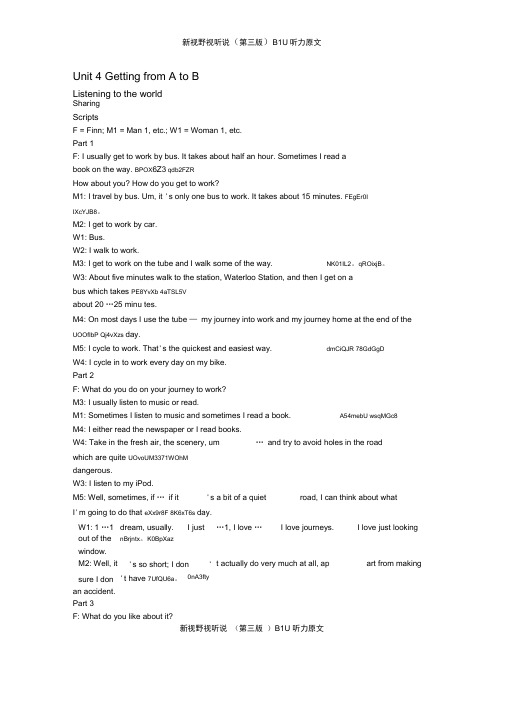
新视野视听说(第三版)B1U听力原文Unit 4 Getting from A to BListening to the worldSharingScriptsF = Finn; M1 = Man 1, etc.; W1 = Woman 1, etc.Part 1F: I usually get to work by bus. It takes about half an hour. Sometimes I read abook on the way. BPOX6Z3 qdb2FZRHow about you? How do you get to work?M1: I travel by bus. Um, it 's only one bus to work. It takes about 15 minutes. FEgEr0IIXcYJB8。
M2: I get to work by car.W1: Bus.W2: I walk to work.M3: I get to work on the tube and I walk some of the way. NK01IL2。
qROixjB。
W3: About five minutes walk to the station, Waterloo Station, and then I get on abus which takes PE8YvXb 4aTSL5Vabout 20 …25 minu tes.M4: On most days I use the tube —my journey into work and my journey home at the end of the UOOfIbP Qj4vXzs day.M5: I cycle to work. That's the quickest and easiest way. dmCiQJR 78GdGgDW4: I cycle in to work every day on my bike.Part 2F: What do you do on your journey to work?M3: I usually listen to music or read.M1: Sometimes I listen to music and sometimes I read a book. A54mebU wsqMGc8M4: I either read the newspaper or I read books.W4: Take in the fresh air, the scenery, um … and try to avoid holes in the roadwhich are quite UOvoUM3371WOhMdangerous.W3: I listen to my iPod.M5: Well, sometimes, if … if it 's a bit of a quiet road, I can think about whatI'm going to do that eXx9r8F 8K6xT6s day.W1: 1 …1 dream, usually. I just …1, I love …I love journeys. I love just looking out of the nBrjntx。
Listening scrit Unit 1
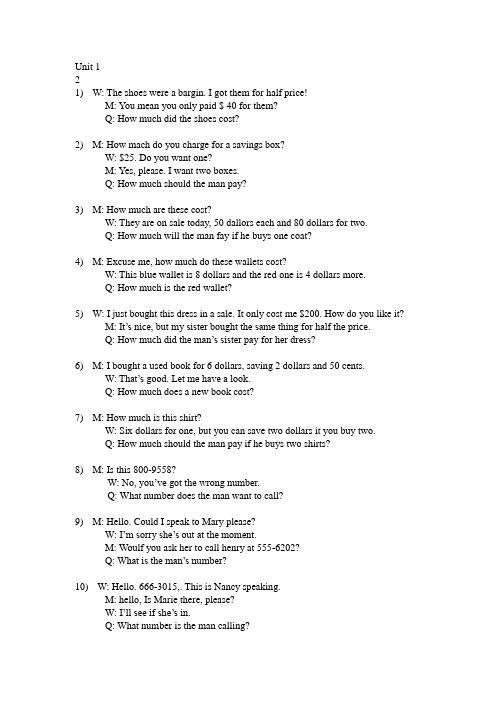
Unit 121)W: The shoes were a bargin. I got them for half price!M: You mean you only paid $ 40 for them?Q: How much did the shoes cost?2)M: How mach do you charge for a savings box?W: $25. Do you want one?M: Yes, please. I want two boxes.Q: How much should the man pay?3)M: How much are these cost?W: They are on sale today, 50 dallors each and 80 dollars for two.Q: How much will the man fay if he buys one coat?4)M: Excuse me, how much do these wallets cost?W: This blue wallet is 8 dollars and the red one is 4 dollars more.Q: How much is the red wallet?5)W: I just bought this dress in a sale. It only cost me $200. How do you like it?M: It’s nice, but my sister bought the same thing for half the price.Q: How much did the man’s sister pay for her dress?6)M: I bought a used book for 6 dollars, saving 2 dollars and 50 cents.W: That’s good. Let me have a look.Q: How much does a new book cost?7)M: How much is this shirt?W: Six dollars for one, but you can save two dollars it you buy two.Q: How much should the man pay if he buys two shirts?8)M: Is this 800-9558?W: No, you’ve got the wrong number.Q: What number does the man want to call?9)M: Hello. Could I speak to Mary please?W: I’m sorry she’s out at the moment.M: Woulf you ask her to call henry at 555-6202?Q: What is the man’s number?10)W: Hello. 666-3015,. This is Nancy speaking.M: hello, Is Marie there, please?W: I’ll see if she’s in.Q: What number is the man calling?Conversation1:W: Paul, I’m nervous.M: Why?W: I’m nervous whenever I put on the headphone.M: But you can enjoy some music first. The music is so nice.W: yes, it is. But when the dialogue begins, I can’t catch a word.M: you don’t have to catch every word. Try to g et the key words.Conversation2:M: How long have you been studying English?W: about four years.M: Do you like it?W: Very much. How about you?M: To be honest, I find it difficult, especially listening.W: well, I think you should listen more, it’s really helpful.M: Thank you very much.Unit 21)W: Did you and your consin graduate in the same year? That is in 1995?M: No, I finished school a year before she did.Q: When did the man graduate?2)W: What time is it now?M: It’s 10:10. You’d better hurry up. The meeting will begin in 15 minutes.Q: When will the meeting begin?3)M: You have tot get to work by 9:00, don’t you?W: No, I start half an hour later today.Q: What time does the woman start work today.4)M: When was John born? On Sept. 9th, 1975?W: No, three days after that.Q: What date is John’s birt hday?5)W: What’s the time by your watch?M: My watch shows 9:30, but I always set it 10 minutes ahead.Q: What’s the correct time?6)W: When does the next bus leave for London?M: Buses leave for London every two hours. You have missed the 8: 30 bus by ten minutes.Q: When will the next bus leave for London?7)M: What’s the time for departure?W: 5:30. That only leaves us 15 minutes to go through customes and check our baggage.Q: At what time did the conversation take place?8)M: I wonder if John will be here by 8: 00. He’s supposed to be.W: His wife said that he left at 7:30, so he should be here by 8: 15 at the latest.Q: What time is John supposed to arrive.9)M: Two hours ago, I saw Jim in his office. Is he home yet?W: No, he said he would be back at 4, but it’s already 5’oclock.Q: When did the man see Jim?10)W: Did you go to the football match last Saturday?M: Oh, yes. It was supposed to start at 2:30, but it was delayed 15 minutes.Q: When did the football match start?Conversation 1W: What are your hops and dreams for the future?M: I guess, to have a little apartment in the city, and make an OK salary. I don’t know, but you know, one day I’d like to start myown company and be the boss. How about you?W: Well, I want to keep in touch with all my friends and also make some new ones so that when I’m order, I have lots of friends.Conversation 2M: Once every four years, the greatest atheletes from all over the world gather together to take part in the Olympic Games.W: I think getting a gold medal must be everyone’s dream.M: But they have to spend long years doing hard and lonely training.W: Of course, After all that hard work, they will go to theOlympics to compete against other excellent competitors.M: Besides, each of them has to overcome difficulies on their way to success.W: Yes. Behind the success ast the tears ans sweat.Unit 31)M: Good morning. I’d like to speak to Mr. Green, please.W: My Dad is not here. I can give you his business number if you’d like to call him at work?Q: Where is Mr. Green now?2)M: Well now, before we order, should we agree on how we we will pay our bill?W: All right.Q: Where are the two speakers?3)W: I wish the bus would come. It’s so cold. Look at the snow.M: And the wind is biting into my skin like a mad dog.Q: Whare are the two speakers?4)W: Excuse me, Sir, I have just come from China, and I’ve never used a Westernlibrary before. I wonder if you could show ne sround here.M: I’d like to do that, but I’m very busy now. Could you come back at about 3:30?Q: Where does the conversation probably take place?5)M: Doesn’t this elevator stop on the fifth floor?W: No, it stops only on the even ones. You can go to the next floor, the sixth floor and then walk down.Q: Where are the two speakers?6)W: Hi, Jerry. This is Lily speaking. There is a law office that’s very interested inyou. Can you go for an interview tomorrow?M: Tomorrow? I’ve got to be college all day tomorrow. How about Wednesday?Q: Where will the man be tomorrow?7)W: Excuse me, Sir. Visiting hours are over now. I’m afraid you must leave. Yourfather is tired.M: I’m sorry, nurse, I didn’t hear the bell. I’m leaving right now.Q: Where are these two speakers?8)M: Kate. Look! The passengers are coming off the plane, and there’s S usan.W: Which one? Do you mean the tall one with the blue suitcase?Q: Where does the conversation take place?9)W: Hve you decided where you are going to live when you retire?M: I would like to live in the country, but my wife wants to live in the suburbs near our children.Q: Where does the man want to live?10)W: We have a wide selection of alarm clocks. What did you have in mind?M: I would like one that will waken me with soft music.Q: Where does this conversation most likely take place?Conversation 1•W: Hi, why do you look so unhappy taday, Mike?•M: I had a terrible quarrel with my neighbor y esterday?•W: How come?•M: It is a long story. Basically, she thought I had laughed at her, but I didn’t.•W: I know no one feels good when he is misunderstood. But talk to her about it next time you see her.•M: Yeah I guess you’re right.Conversation 2•M: hi, Rose! What’s up?•W: Oh, not much. What have you been doing recently? David?•M: I’ve been chatting online a lot with my friends.•W: Where do you go to chat?•M: I usually use Yahoo Messenger. What about you?•W: I have never chatted online before.•M: What? How is that possible? Why not?W: Well, my computer is really old, so most software can’t be runin my computer.M: Do you want to come over to use mine? I can show y ou how touse it.Unit 41)W: How long wil it take you to fix my watch?M: I’ll call you when it is ready, but it shouldn’t take longer than a week.Q: What is the probable relationship between the speakers?2.A: Go to bed early and get some rest, Jack.B: But I have a study. We are going to have a history test tomorrow morning.Q:what does the man do?3.A: Is Aunt Margaret in? I’ve got something important to tell her.B: Sorry, Mom has gone shopping. She won’t be back until noon.Q: What us the probable relationship between the speakers4.A: Mr. Smith, I’d like to talk to you about my term paper. When will it beconvenient?B: what about 4 o’ clock tomorrow afternoon?Q: What is the man?5.A: I don’t have an appointment , but could I see Mr. Wang for just a few minutes?B: I’m very sorry, but he meets people only by appointment.Q: What is the woman probably?6.A: I heard you got full marks in the math exam. Congratulations!B: Thanks! I’m sure you also did a good job.Q: What is the probable relationship between the speakers7. A: Excuse me, Madam. Does this bus go to Zhongshan road?B: Yes, I think so.A: thank you.B: You’re welcome.Q: What is the ralationship between the speakers8.A: I think I’m running a temperature/ have a fever. I feel terrible.B: Well, I’d better examine you right now. would you take off your overcoat, please.Q: What is the probable relationship between the speakers9)A: Honey! We must hurry or we will be late for the party.B: My dear, I don’t know where my ring is . I should wear it to the party.Q: What is the probable relationship between the speakers10)A: Have you got a table for two?B: Yea, Madam, this way please.Q: What is the most likely relationship between the speakersConversation 1W: Say, what is your favorite sports ?M: Hmmm, it is hard to say. I like golf a lot, but I guess I like tennis better.W: Do you play much tennis?M: Yes, quite a bit. How about a game sometime?W: Sorry, I am strictly a spectator---football, baseball, basketball, golf… I watch them all.Conversation 2W: Is this your first time to attend the Junior High School sport meeting?M: Yes, and it’s great.W: Our neighbor, Bruce, will take part in the 400 m race. The race will begin in 5 minutes. It’s ens e here.M: Wonderful, Bruce is taking the lead.W: some competitors have almost caught up with him.M: Come on. Come on, Bruce.W: Wow, Bruce crossed the line first.M: This is so exciting. Let’s ask him to dinner tonight.W: That is a good idea.。
3_Listening倾听
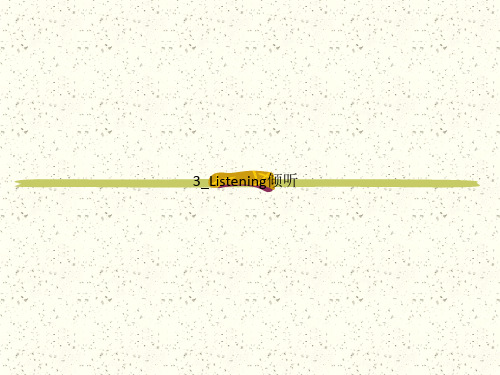
Active Listening Skills
Paraphrasing Reflecting meaning Reflecting feelings Reflecting conclusions
How Can I Improve My Listening Habits?
Refuse to tolerate undesirable or ineffective habits.
Replace undesirable habits with effective ones.
Copyright © 2010 Pearson Education, Inc. Publishing as Prentice Hall
Copyright © 2010 Pearson Education, Inc. Publishing as Prentice Hall
Developing Good Listening Habits
Stop talking. One conversation at a time. Empathize with the person speaking. Ask questions. Don’t interrupt.
Copyright © 2010 Pearson Education, Inc. Publishing as Prentice Hall
How Can I Improve My Listening Habits?
Professor James J. Floyd has suggested a system for improving the ways in which we listen to the rest of the world. The first phase involves four steps:
How to Improve Your Listening Skills

How to Improve Your Listening Skills如何提高你的听力技巧引言:听力是我们日常生活中不可或缺的一项技能。
无论是在学习、工作还是社交交流中,良好的听力技巧都能够帮助我们更好地理解他人,并更加高效地完成任务。
然而,由于各种原因,许多人都存在听力不佳的问题。
本文将探讨如何提高听力技巧,并给出一些实用的建议。
一、培养专注力专注力是提高听力技巧的关键。
在日常生活中,我们常常会受到各种干扰,如噪音、手机等。
这些干扰会分散我们的注意力,导致我们无法集中精力去听。
因此,培养专注力是提高听力技巧的第一步。
如何培养专注力呢?首先,我们可以通过锻炼注意力来提高专注力。
比如,我们可以选择一个安静的环境,将注意力集中在一个特定的声音上,如钟摆的摆动声或自然的声音。
通过不断地练习,我们的专注力将得到提高。
另外,我们还可以通过减少干扰来提高专注力。
在学习或工作时,我们可以选择一个相对安静的地方,关闭手机或将其调至静音模式,以避免被来电或信息打断。
此外,我们还可以使用耳塞或耳机来隔绝外界噪音,从而更好地专注于听力任务。
二、拓宽听力素材拓宽听力素材是提高听力技巧的另一个重要方面。
我们常常会发现,我们在听不懂某些特定话题的对话或讲座时,往往是由于我们对该话题的背景知识不足而导致的。
因此,我们需要拓宽听力素材,提高自己的背景知识,以便更好地理解他人的讲话。
如何拓宽听力素材呢?首先,我们可以选择不同主题的听力材料进行训练。
比如,我们可以选择听一些关于科技、历史、文化等不同领域的讲座或对话,以提高自己对不同话题的理解能力。
此外,我们还可以通过阅读来拓宽自己的背景知识。
阅读不同领域的书籍、文章或新闻,可以让我们对各种话题有更深入的了解,从而更好地理解他人的讲话。
三、练习听力技巧练习听力技巧是提高听力能力的重要途径。
通过不断地练习,我们可以提高自己的听力技巧,更好地应对各种听力任务。
如何练习听力技巧呢?首先,我们可以选择一些听力材料进行反复练习。
How to Improve Your English Listening Ability
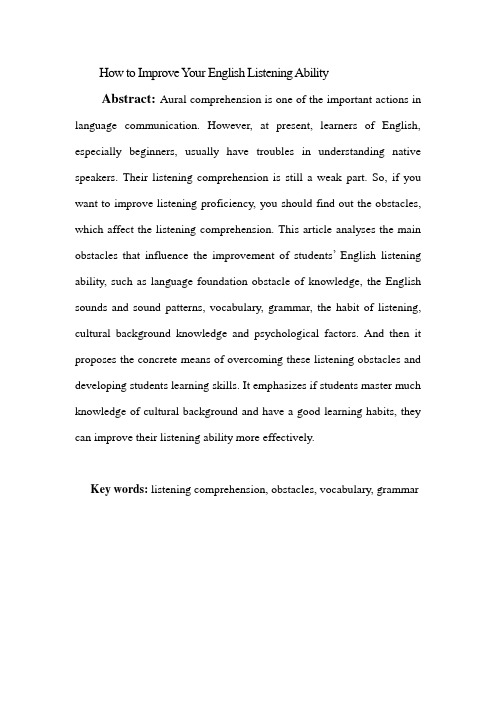
How to Improve Y our English Listening AbilityAbstract:Aural comprehension is one of the important actions in language communication. However, at present, learners of English, especially beginners, usually have troubles in understanding native speakers. Their listening comprehension is still a weak part. So, if you want to improve listening proficiency, you should find out the obstacles, which affect the listening comprehension. This article analyses the main obstacles that influence the improvement of students’English listening ability, such as language foundation obstacle of knowledge, the English sounds and sound patterns, vocabulary, grammar, the habit of listening, cultural background knowledge and psychological factors. And then it proposes the concrete means of overcoming these listening obstacles and developing students learning skills. It emphasizes if students master much knowledge of cultural background and have a good learning habits, they can improve their listening ability more effectively.Key words: listening comprehension, obstacles, vocabulary, grammar摘要: 听是语言交际中的重要环节之一。
视听说教程例文unit1book1
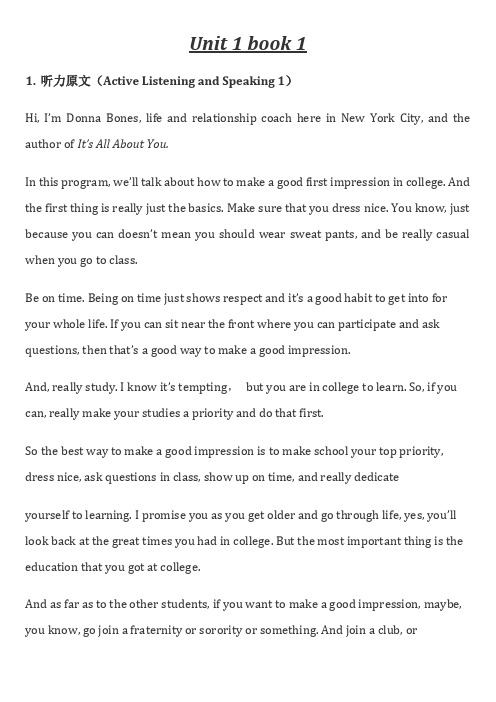
Unit 1 book 11.听力原文(Active Listening and Speaking 1)Hi, I’m Donna Bones, life and relationship coach here in New York City, and the author of It’s All About You.In this program, we’ll talk about how to make a good first impression in college. And the first thing is really just the basics. Make sure that you dress nice. You know, just because you can doesn’t mean you should wear sweat pants, and be really casual when you go to class.Be on t ime. Being on time just shows respect and it’s a good habit to get into for your whole life. If you can sit near the front where you can participate and ask questions, then that’s a good way to make a good impression.And, really study. I know it’s temptin g,but you are in college to learn. So, if you can, really make your studies a priorityand do that first.So the best way to make a good impression is to make school your top priority, dress nice, ask questions in class, show up on time, and really dedicateyourself to learning. I promise you as you get older and go through life, yes, you’ll look back at the great times you had in college. But the most important thing is the education that you got at college.And as far as to the other students, if you want to make a good impression, maybe, you know, go join a fraternity or sorority or something. And join a club, orsomething else to get you involved with other people, because then you can get to meet other people and make new friends.So I think, as long as you’re true to yourself, and confident in yourself, and proud of yourself, you’ll always make a good first impression no matter where you go.2.words bankSome examples for your reference:WordsSentences casual I had no idea what Sunday lunch meant in French terms, whether it wasformal or casual .priority His first priority was to find someone who could aid him in his search. dedicate Divide up what you have to learn into manageable parts and thendedicate one day to one part.involvePeople should note that health funds are not morally acceptable as theymay include companies involved in animal testing. confident There were times when I’d done both those things, but still wasn't very confident .participate The athlete refused to participate in the games for political reasons.3.how to start a conversationExpression for starting a conversation at a Party or Club:—What an amazing party! Hi, my name’s Mark.Expression for starting a conversation in a Public Place:—Hi, my name's Penny. I’d offer to shake your hand, but I broke my arm while rock climbing last weekend.Expression for starting a conversation at a Music Venue:— What do you think of the concert?prehensiveSydney White (2007)Clip OneDad:Sydney! Time to get a move on, sweetheart! Wow. You know, if Mom was here, she’d know exactly what to say. She'd be so excited you're going to her school, gonna join her sorority.Sydney: I’m not in yet, Dad.Dad:Girl, you’re gonna fit into that place like a... overflow tube in a pressure tank. Sydney:Come on, Dad. We said no mushy stuff.Dad:Right. No mushy stuff. Come here.Sydney: I love you, Dad.Mom:Dear Sydney, I love you so much. I’m so sorry I’m not there to see you off to college. But since I can’t be, I've put some of my favorite memories in this box. Live every moment, Sydney. Grabevery opportunity. And have fun in everything you do. The friends you meet in college will be your friends for life. Perhap s you’ll fill this box with your own memories to pass on to your daughter someday. And know that though I can't be there with you now, I'm always right by your side every step of the way.Clip TwoProfessor:We live in a country that’s considered to be t he ultimate model of government. By the people, for the people, and of the people. But most Americans would be surprised to find how afraid the Founding Fathers were of what a direct democracy could do to the country. Can anyone tell me why? The young man snoring there, perhaps?Student 1:The Founding Fathers were afraid that direct democracy would do to America what it did to Rome. Alexander Hamilton even advocated a monarchy. (snores)Professor:Exactly. We are trained to think the more power the people have, the better. Can any of you tell me some reasons why this isn’t necessarily true? Ah, Terrence. Still here after eight years. What do you say we give someone else a chance to respond this time, huh? Um... Ms. Witcburn?Ms. Witchburn:Most Amer icans don’t educate themselves about the issues. There are some valid arguments for keeping things a little bit more... elite. You could even argue a case for certain types of oligarchy.Professor:Interesting. Let's hear from someone else. How about... you? Ms?Sydney:White.Professor:Ms. White. Any thoughts?Sydney:Um... I guess I think that's... underestimatingthe masses a bit. Not to mention overestimatingthe elites. Apartheid was an oligarchy, and no one wants that again. Professor:Excellent.5.词汇1.适应大学fit into the college2.不要伤感。
八年级上册Module 1 How to learn EnglishUnit1教案
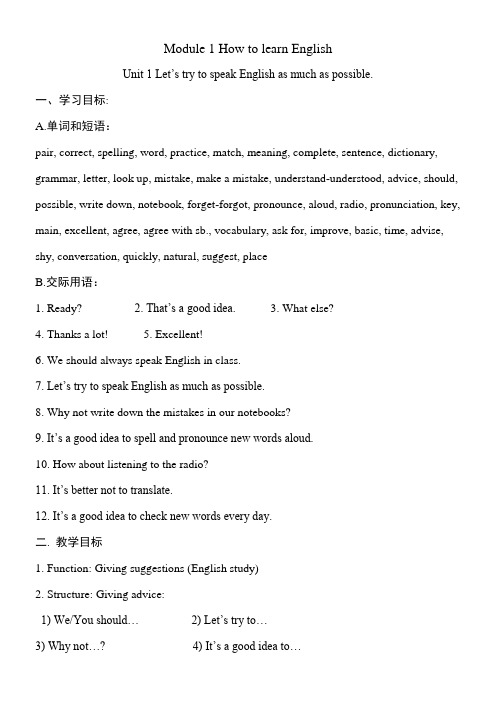
Module 1 How to learn EnglishUnit 1 Let’s try to speak English as much as possible.一、学习目标:A.单词和短语:pair, correct, spelling, word, practice, match, meaning, complete, sentence, dictionary, grammar, letter, look up, mistake, make a mistake, understand-understood, advice, should, possible, write down, notebook, forget-forgot, pronounce, aloud, radio, pronunciation, key, main, excellent, agree, agree with sb., vocabulary, ask for, improve, basic, time, advise, shy, conversation, quickly, natural, suggest, placeB.交际用语:1. Ready?2. That’s a good idea.3. What else?4. Thanks a lot!5. Excellent!6. We should always speak English in class.7. Let’s try to speak English as much as possible.8. Why not write down the mistakes in our notebooks?9. It’s a good idea to spell and pronounce new words aloud.10. How about listening to the radio?11. It’s better not to translate.12. It’s a good idea to check new words every day.二. 教学目标1. Function: Giving suggestions (English study)2. Structure: Giving advice:1) We/You should…2) Let’s try to…3) Why not…?4) It’s a good idea to…5) How about…?6) Why don’t we/you…?7) It’s better not to…3. Skills: 1) Listening and understanding familiar topics (English study).2) Talking about problems in English study and giving advice, conductingconversations in several turns.3) Reading and finding specific information about English study.4) Drafting a letter asking for advice about English study, revising through pairdiscussion..4. Around the world: English online5. Task: Writing your English study plan.三、重点及难点:Giving advice: 1) We/You should…2) Let’s try to…3) Why not…? 4) It’s a go od idea to…5) How about…? 6) Why don’t we/you…? 7) It’s better not to…四、教学设计:Unit 1 Let’s try to speak English as much as possible.ⅠTeaching modelListening and speakingⅡTeaching methodPWP approachⅢTeaching aims1. To understand conversations involving advice on learning English.2. To get information about how to learn English from the conversation.3. To understand the way of giving advice.4. To practise giving advice on English learning.ⅣTeaching Objectives1. Key vocabulary: pair, correct, spelling, word, practice, match, meaning, complete,sentence, dictionary, grammar, letter, look up, mistake, make amistake, understand-understood, advice, should, possible, write down,notebook, forget-forgot, pronounce, aloud, radio, key, main, excellent,agree, agree with sb., vocabulary2. Key structures: 1) We/You should…2) Let’s try to…3) Why not…? 4) It’s a good idea to…5) How about…? 6) Why don’t we/you…? 7) It’s better not to…ⅤTeaching aidsTape recorder, OHP , videoⅥTeaching StepsStep 1 Warming up1. Show some pictures of school things. Say how to learn English well.2. Read the words after the teacher.3. Introduce the new words.4. Learn the new words.Step 2 Read and check.1. Read the instructions in Activity 1and check(√) the ones you understand.1) Work in pairs. Ask and answer the questions.2) Correct the spelling.3) Listen and check the words you hear.4) Practise saying the words.5) Match the words with the meaning.6) Complete the sentences with the words in the box.3. Ask the students to check their answer with a partner.4. Call back the answer from the whole class and check the answer.Step 3 Listen and repeat.1. Ask the students to read the word and expressions in Activity2.dictionary grammar letter look up make a mistake meaning understand 2. Read through the questions.1) Which word did Daming not understand?2) What mistake did Lingling make?3) How does Daming usually check the spelling of a word?4) Why is it difficult for Daming to check the spelling of cinema?3. Play the recording and ask the students to listen to the recording carefully.4. Listen and answer the questions. Use the words and expressions from the box.5. Play the recording again, then they can check their answer with a partner.6. Call back the answer from the whole class and check the answer.Step 4 Listen and read.1. Show some pictures, and ask the students to talk about them.2. Ask the students to read the conversation silently.3. Play the recording and ask the students to listen and read the conversation.4. Read the conversation.5. Act it out.6. Learn “Everyday English”Ready? That’s a good idea.What else?Thanks a lot! Excellent!7. Tell the students how to learn English well.1) We should always speak English in class.2) Let’s try to speak English as much as possible.3) Why not write down the mistakes in our notebooks?4) Don’t forget to write down the correct answers next to the mistakes.5) It’s a good idea to spell and pronounce new words aloud every day.6) How about listening to the radio?7) How about reading English stories?8) W hy don’t we try to find some English pen friends?Step 5 Writing.1. Read the conversation again.2. Ask the students to write notes about learning English.Listening : listen to the radioSpeaking : ___________________________________________________Reading : ____________________________________________________Writing: ____________________________________________________Learning new words: ___________________________________________3. Ask the students to check with a partner.4. Check the answers:Step 6 Underline the correct words and expressions.1. Ask the students to read through the passage in Activity 4.Here’s my (1) advice / notebook abo ut learning English. Speak English (2) always / as much as possible in class, and listen to English (3) in the newspaper / on the radio. I (4) agree / forget it’s a good idea to look up new worlds in the ( 5) notebook / dictionary. You can find the (6) correct / excellent pronunciation and learn the meaning2. Underline the correct words and expressions.3. Check with a partner.4. Call back the answers from the whole class.5. Read the passage together.Step 7 Listen and repeat.1. Play the recording once without stopping.2. Play the recording again and ask the whole class to repeat.1) We should always speak English in class.2) Let’s try to speak English as much as possible.3) Why not write down the mistakes in our notebooks?4) It’s a good idea to spell and pronounce new words aloud.5) How about listening to the radio?3. Ask the students to listen and mark the intonation.4. Now listen again and repeat.Step 8 Work in pairs.1. Talk about problems and give advice.Problems AdviceI can’t…How / What about …?I don’t know… Why not / don’t you …?2. Read through the example with the class.—I can’t speak English well. What should I do?—Why don’t you try to talk to our classmates in English?3. Work in pairs.Step 9 Important and difficult points1 Why not write down our mistakes in our notebooks?何不在笔记本上把我们的错误记下来?Why not …? 用来表示提出某种建议,而不是询问为什么不做某事的原因,例如:Why not take a walk in the park ?何不在公园里散散步?我们还可以用下面的表达方式来提建议:Why don’t we drive to the country?我们何不开车去乡下?What / How about going to Europe for a holiday?去欧洲度假怎么样?Write down 或者put down 表示“记下,写下”。
1 listening

as people say? M:It used to be even better. Q:How’I the university?
5. M :I’m worried about sending
Shelly to college.Most college students are so wild now. W:Only a few are. Q:What does the woman mean?
1.W:Oh,no.It’s 8 o’clock already.I
still haven’t finished the exercises. M:Don’t worry.The clock is half an hour fast. Q:When does the conversation happen?
新视野英语教程 听说教程 Unit 1
Telling Apart Testing Your Ears Opening Your Mouth Talking Together Enjoy Yourself
Testing your ears
Task 1
1.What are you studying?
8. M :I’d like you to hand in your
paper the day after tomorrow. W:So I should hand it in on Friday. Q:What day is today?
Task 3
Conversation1 W:Frank,what subjects were you most
3. M :The techer said we might have
译林版牛津英语9A 全册知识点解析

4)“确实是这样”,表示对前面陈述事实的强调,结构为so+主语+助动词/情态动词/be动词
例:Tony works very hard at all the subjects.So he does.
(1)用于否定句。提出两或多种事物。意为“也不”。
例: I can’t sing or dance.我不会唱歌也不会跳舞。
(2)用于警告或忠告,意为“否则,不然”
例: Hurry up, we will be late.快点,否则我们要迟到了。
(3)用于两个数字之间表示约略数目,意为“大约”。
例:There are six or seven children in the room.房间里大约六七个孩子。
After working all afternoon,we quickly ate up all of the dinner.我们整整干一个下午以后,一会儿就把饭吃光了。
(2)use all of用完;消耗
Extravagance ate up his inheritance.奢侈的生活耗尽了他继承的遗产。
“I think so.”
3)“也是,也一样”结构为so+助动词/情态动词/be动词+主语
例:Tony takes exercise every day and so does his younger brother.
注意否定句应把so改为neither/nor,结构为neither/nor+助动词/情态动词/be动词+主语
6. We can’t afford to make any mistakes.我们承担不起任何错误(所造成的后果)
英语小作文:HowtoBeaGoodListener
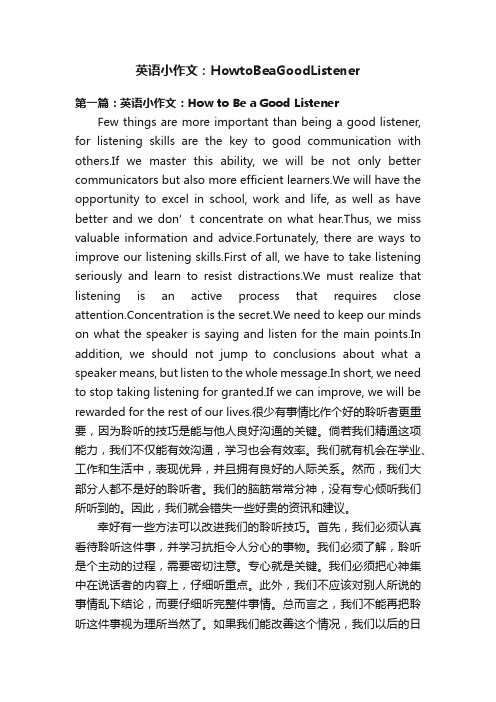
英语小作文:HowtoBeaGoodListener第一篇:英语小作文:How to Be a Good ListenerFew things are more important than being a good listener, for listening skills are the key to good communication with others.If we master this ability, we will be not only better communicators but also more efficient learners.We will have the opportunity to excel in school, work and life, as well as have better and we don’t concentrate on what hear.Thus, we miss valuable information and advice.Fortunately, there are ways to improve our listening skills.First of all, we have to take listening seriously and learn to resist distractions.We must realize that listening is an active process that requires close attention.Concentration is the secret.We need to keep our minds on what the speaker is saying and listen for the main points.In addition, we should not jump to conclusions about what a speaker means, but listen to the whole message.In short, we need to stop taking listening for granted.If we can improve, we will be rewarded for the rest of our lives.很少有事情比作个好的聆听者更重要,因为聆听的技巧是能与他人良好沟通的关键。
外研版八年级英语上册全部课文及翻译
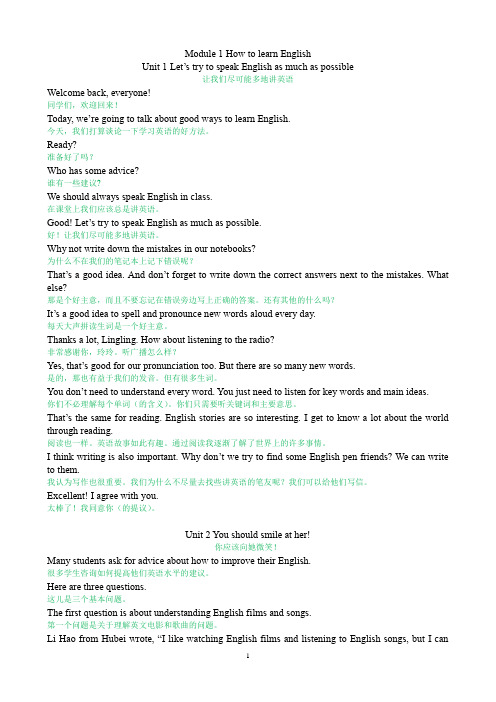
Module 1 How to learn EnglishUnit 1 Let’s try to speak English as much as possible让我们尽可能多地讲英语Welcome back, everyone!同学们,欢迎回来!Today, we’re going to talk about good ways to learn English.今天,我们打算谈论一下学习英语的好方法。
Ready?准备好了吗?Who has some advice?谁有一些建议?We should always speak English in class.在课堂上我们应该总是讲英语。
Good! Let’s try to speak English as much as possible.好!让我们尽可能多地讲英语。
Why not write down the mistakes in our notebooks?为什么不在我们的笔记本上记下错误呢?That’s a good idea. And don’t forget to write down the correct answers next to the mistakes. What else?那是个好主意,而且不要忘记在错误旁边写上正确的答案。
还有其他的什么吗?It’s a good idea to spell and pronounce new words aloud every day.每天大声拼读生词是一个好主意。
Thanks a lot, Lingling. How about listening to the radio?非常感谢你,玲玲。
听广播怎么样?Yes, that’s good for our pronunciation too. But there are so many new words.是的,那也有益于我们的发音。
介绍倾听的方法英语作文
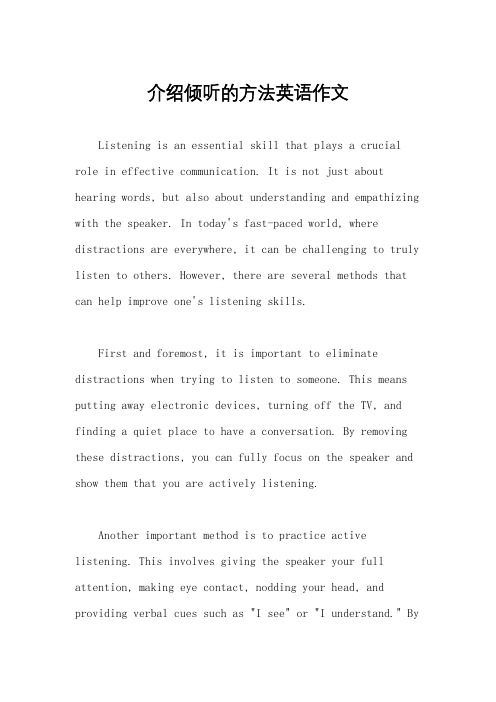
介绍倾听的方法英语作文Listening is an essential skill that plays a crucial role in effective communication. It is not just about hearing words, but also about understanding and empathizing with the speaker. In today's fast-paced world, where distractions are everywhere, it can be challenging to truly listen to others. However, there are several methods that can help improve one's listening skills.First and foremost, it is important to eliminate distractions when trying to listen to someone. This means putting away electronic devices, turning off the TV, and finding a quiet place to have a conversation. By removing these distractions, you can fully focus on the speaker and show them that you are actively listening.Another important method is to practice active listening. This involves giving the speaker your full attention, making eye contact, nodding your head, and providing verbal cues such as "I see" or "I understand." Byactively engaging with the speaker in this way, you can show them that you are interested in what they have to say and that you value their thoughts and opinions.Additionally, it is important to ask clarifying questions when necessary. If you are unsure about something the speaker has said, don't be afraid to ask for clarification. This not only shows that you are engaged in the conversation, but it also helps ensure that you understand the speaker's message correctly.Furthermore, it is important to practice empathy when listening to others. Try to put yourself in the speaker's shoes and see things from their perspective. This can help you better understand their feelings and emotions, and it can also help you respond in a more compassionate and understanding way.In conclusion, listening is a skill that can be developed and improved with practice. By eliminating distractions, practicing active listening, askingclarifying questions, and showing empathy, you can become abetter listener and a more effective communicator. So next time you find yourself in a conversation, remember these methods and try to implement them to enhance your listening skills.。
如何正确倾听英文作文
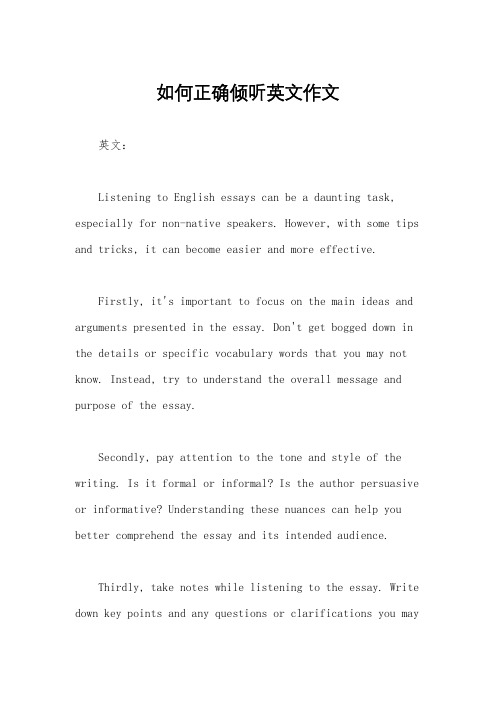
如何正确倾听英文作文英文:Listening to English essays can be a daunting task, especially for non-native speakers. However, with some tips and tricks, it can become easier and more effective.Firstly, it's important to focus on the main ideas and arguments presented in the essay. Don't get bogged down in the details or specific vocabulary words that you may not know. Instead, try to understand the overall message and purpose of the essay.Secondly, pay attention to the tone and style of the writing. Is it formal or informal? Is the author persuasive or informative? Understanding these nuances can help you better comprehend the essay and its intended audience.Thirdly, take notes while listening to the essay. Write down key points and any questions or clarifications you mayhave. This will help you retain the information and also provide a reference for later.Lastly, practice makes perfect. The more you listen to English essays, the more comfortable and confident you will become. Don't be afraid to listen to a variety of topics and styles to broaden your understanding and improve your listening skills.中文:正确倾听英文作文可能对于非母语者来说是一个艰巨的任务。
如何积极倾听英语对话作文
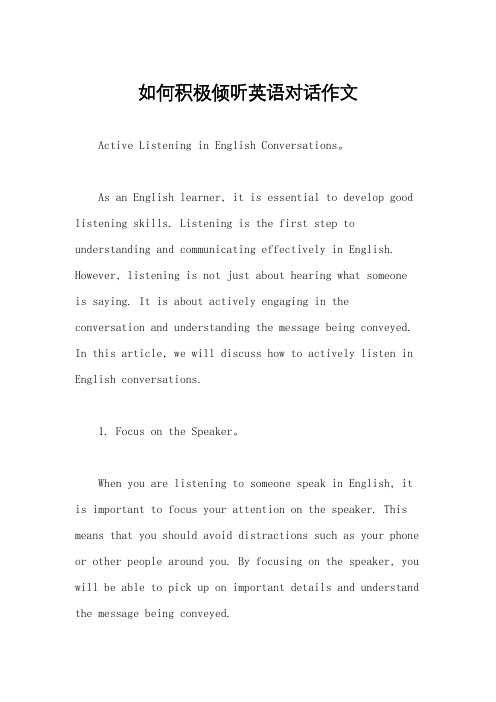
如何积极倾听英语对话作文Active Listening in English Conversations。
As an English learner, it is essential to develop good listening skills. Listening is the first step to understanding and communicating effectively in English. However, listening is not just about hearing what someone is saying. It is about actively engaging in the conversation and understanding the message being conveyed. In this article, we will discuss how to actively listen in English conversations.1. Focus on the Speaker。
When you are listening to someone speak in English, it is important to focus your attention on the speaker. This means that you should avoid distractions such as your phone or other people around you. By focusing on the speaker, you will be able to pick up on important details and understand the message being conveyed.2. Pay Attention to Non-Verbal Cues。
英语跟听对话的技巧
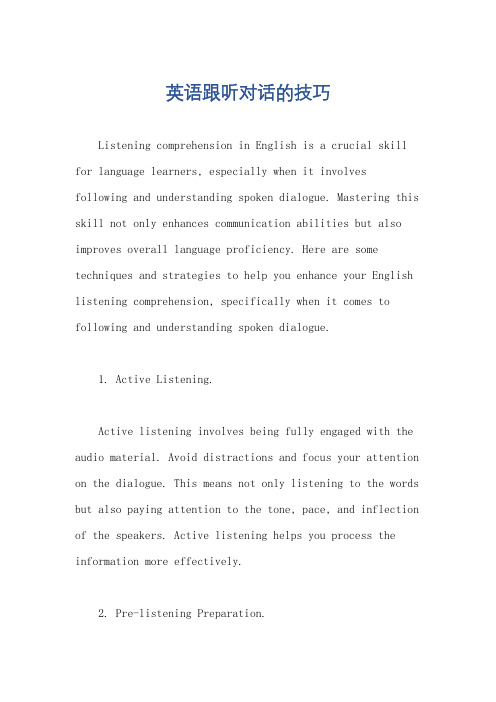
英语跟听对话的技巧Listening comprehension in English is a crucial skill for language learners, especially when it involvesfollowing and understanding spoken dialogue. Mastering this skill not only enhances communication abilities but also improves overall language proficiency. Here are some techniques and strategies to help you enhance your English listening comprehension, specifically when it comes to following and understanding spoken dialogue.1. Active Listening.Active listening involves being fully engaged with the audio material. Avoid distractions and focus your attention on the dialogue. This means not only listening to the words but also paying attention to the tone, pace, and inflection of the speakers. Active listening helps you process the information more effectively.2. Pre-listening Preparation.Before listening to a dialogue, take a moment to familiarize yourself with the context. If you have access to any background information or vocabulary related to the topic, review it briefly. This preparation can help you anticipate and understand the content more easily.3. Use Context Clues.Context clues are extremely important in understanding dialogue. Even if you don't catch every word, the context surrounding it can often provide enough information to deduce its meaning. Listen for key words, phrases, and relationships between ideas to help you fill in any gaps.4. Note-taking.Taking notes while listening can be a valuable tool. Jot down key points, ideas, or vocabulary that you.。
HowtoImproveYourListening
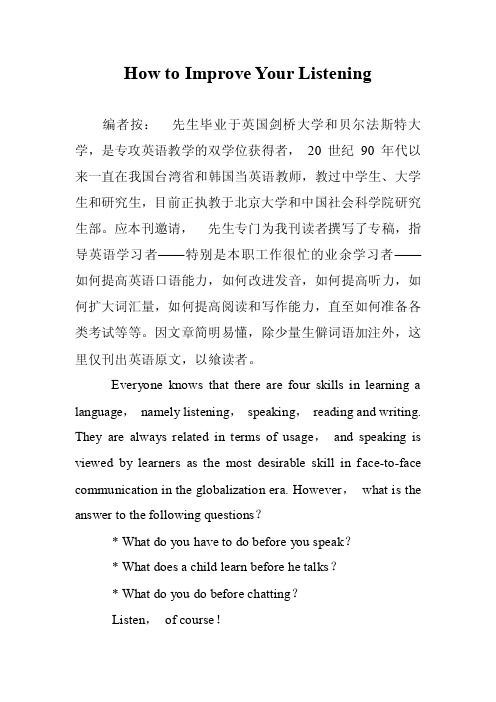
How to Improve Your Listening编者按:先生毕业于英国剑桥大学和贝尔法斯特大学,是专攻英语教学的双学位获得者,20 世纪90 年代以来一直在我国台湾省和韩国当英语教师,教过中学生、大学生和研究生,目前正执教于北京大学和中国社会科学院研究生部。
应本刊邀请,先生专门为我刊读者撰写了专稿,指导英语学习者——特别是本职工作很忙的业余学习者——如何提高英语口语能力,如何改进发音,如何提高听力,如何扩大词汇量,如何提高阅读和写作能力,直至如何准备各类考试等等。
因文章简明易懂,除少量生僻词语加注外,这里仅刊出英语原文,以飨读者。
Everyone knows that there are four skills in learning a language,namely listening,speaking,reading and writing. They are always related in terms of usage,and speaking is viewed by learners as the most desirable skill in face-to-face communication in the globalization era. However,what is the answer to the following questions?* What do you have to do before you speak?* What does a child learn before he talks?* What do you do before chatting?Listen,of course!In English learning,not enough attention is paid to listening. You have one mouth but two ears!Therefore,we should listen twice as much as we speak. Did you ever ask yourself,“How did I learn my own language?” In fact you never really learned it at all ——you just started speaking it. But this speaking was the result of hearing your native language for two or three years. All that hearing was necessary for you to start speaking. For two years words went IN to your head and then words came OUT of your head. That is why hearing English as much as possible is so important to you now. The more English you put in,the more you’ll get out!Why is listening good for you ?Listening is good for the English student because:1. When listening,you are reviewing a lot of English usage such as vocabulary,grammatical structures,intonation,accent and your own interpretation.2. You can learn new words and expressions by hearing them frequently.3. General knowledge gained from television or radio news,features,or even advertising spots is certainly beneficial if you are a regular listener.4. You can imitate what you hear and apply it with greatconfidence.5. Listening can be a great “hobby” while you do other things such as cooking,exercising,relaxing,etc. In other words,you have no wasted time at all.6. Listening is also a great way to train your attention.The results of good listeningConfidenceTo be able to listen well gives you confidence in communication. And the more confident you are at listening the more confident you will be at speaking.Good communicationYou can only talk sensibly when you can understand what is said to you. Failing that,you may miss important information presented to you,or respond in a funny way. Good communication means longer communication that is worthwhile communication. The better you become at communication the more foreigners will want to talk with you.Develop good listening skillsListening in everyday life is a real-time skill. Unlike reading,you often don’t have the chance to adjust the pace of speech,listen again or check an unknown word. The need to understand what you hear on the spot makes it even morecrucial that you develop the ability to listen well.Basic advice about improving your listening1. Don’t worry if you don’t understand every word. Do you think that listening is about getting every word that is spoken?If so,think again. Even though good listeners may be able to get every word they hear,this is not their concern most of the time,as our experience with our first language tells us. Have objectives. So do specify your listening objectives when you carry out a listening activity. As long as you achieve your objectives,you are a good listener ——whether you catch every word or not.2. Be a good listener. To start to be a good listener try this. Face the speaker squarely,lean slightly toward the speaker,do not fold your arms across your chest,look at the speaker,let them know you are attending. The speaker will pick up on this and will also become more relaxed. Listening is a part of communication.Good listening habits1. Pay attention to the listener,even though the subject may be boring.2. Wait for the speaker to finish before you speak.3. Maintain eye contact.4. Listen for feelings as well as subject matter.5. Show non-verbal responses to listening to demonstrate that you are listening such as nodding,smiling,leaning forward,etc.6. Give brief verbal responses:“Yes,” “Yeah”,“Uh-hum,” “M-m-m,” “Oh,” etc.7. Only ask questions to clarify something said.8. Demonstrate you have an open mind by not responding negatively to the other person’s ideas or feeling.9. Paraphrase what you hear to make sure you have heard it correctly.10. W ork to make yourself really want to listen.11. Listen carefully to understand the main message.12. Maintain emotional control,no matter what is said.Bad listening habitsThe following are bad listening habits and can become irritating to the speaker. Try to avoid them whenever possible.1. Interrupting the speaker.2. Not looking at the speaker.3. Rushing the speaker and making him feel that he’s wasting the listener’s time.4. Showing interest in something other than theconversation.5. Getting ahead of the speaker and finishing his thoughts.6. Not responding to the speaker’s requests.7. Saying,“Yes,but … ” as if the listener has made up his mind.8. Topping the speaker’s story with “That reminds me … ” or “That’s nothing,let me tell you about … ”9. Forgetting what was talked about previously.10. Asking too many questions about detail.Practical ways to improve your listeningThe following are just a few ways in which you can improve your listening.Radio. Listen to the radio,especially V oice of America and the BBC W orld Service. News reports are ideal practice materials because they are easily accessible and there is a real reason for you to listen. You want to know what’s happening in the world. You could wake up five minutes earlier and listen to the news in English. Make it a goal to learn several new words every time. Try to imitate the announcer. Talk along with him.Television. TV is an excellent resource for hearing and listening to English. The pictures help you understand what is being said. Especially watch CCTV 9,which is the Englishchannel,to improve your listening skills. Try watching the news in English instead of Chinese. If you don’t have access to a TV you may be able to watch movies on the Internet. Listening to others talk is good preparation for talking yourself.Internet. It is now a lot easier to hear English-language radio news on the Internet. To be able to listen to radio on the Internet,you’ll need to have special software called “players” installed on your computer. Most sites work with two players ——the RealPlayer from RealNotworks and the Windows Media Player from Microsoft. Both these packages are free and you may already have them installed on your computer. Search for English material on the net. Instead of chatting in Chinese on the net why not try chatting in English!Check out web sites on the Internet that have been designed for,or by,students. Dave’s ESL Cafe ,Linguistic Funland and Virtual English Language Center are good examples. Why not try which has recently come on line and is a joint Sino-British language learning project with support from the British Council,China Central Radio and Television University and the BBC. Two sections of this free website will interest you:“Living English” offers English language materials developed by the BBC and focuses on recreational English for sports,travel and music.“W orking English” is intended for business profess ionals and has a systematic business English programme to improve business vocabulary,negotiation techniques and spoken English.Music/ songs. Songs in English are everywhere,even on foreign-language radio and TV stations. Listen to them often and try to read the words of their songs. Repeat. Sing along. Write five sentences using some of the new words you hear. Enjoy singing in English with your friends. When you go to Karaoke bar try to sing at least one English song. Buy some cassettes or CDs,or make recordings,and try to write the words for an entire song.Cinema. Outside the English-speaking world,many large cities have cinemas that show films in English,usually with subtitles. Make it a habit to go to these films. When you go to see English films,try not to read the Chinese subtitles. If you need to read the subtitles,at least you’ll be hearing English even if you don’t understand it.Video/ VCD/ DVD. DVD has one really great advantage. You can play it over again. You can turn ordinary viewing into an active language learning exercise by:stopping the disc and comparing what you hear to whatthe subtitles saykeeping a diary of any new expressions or words you learnrecording any interesting or unusual translations you heartaking notes of any gestures or other body language you seecovering any subtitles with paperrecording programmes from television and then watching them several times to improve your understandingplaying English video games!Tapes. Listen to tapes. Find books-on-tapes in your local library. Listen while you are relaxing in your dormitory or while walking or cycling if you have a Walkman. Choose a famous person whose accent you like,and if you can get recordings of him or her,imitate the way he/she speaks. You could also tape your own voice and analyse your own speech. You could also send a copy to your foreign teacher and let them correct your grammar and pronunciation. Exchange taped messages with a classmate. Record a few minutes and then ask your classmate to respond on the same tape.Lectures. Lectures are the main way of communicating knowledge at university,so it would be of great benefit if youcan improve your ability to better understand lectures. Comprehending academic lectures in a second language is not an easy task,because it involves skills such as coping with the lecturer’s speech characteristics ,identifying the main ideas,and not-taking. Try the following suggestions:* Jot down notes of the main points of the lecture and compare this with the lecturer’s handout to see what you have got or missed* Compare and discuss your comprehension with another student’s* Record the lecture using a Walkman and check your comprehension and notes as you listen to it again* Review your notes shortly after the lecture to help you to remember the contents better,annotating or highlighting any key points for easy revisionFriends. Find a friend who also wants to improve his or her English and have lunch or dinner together ——speaking English of course. Make it a rule to have one evening a week in your dormitory as an English evening when only English is spoken. Introduce penalties if this rule is broken. Of course,this will practice your listening as well as your speaking. And if you don’t have a lot of time to go out and meet people,at leastyou can chat a little by telephone. Play games printed in English,which require some knowledge of English 。
【英语学习方法】How to Improve Your Listening
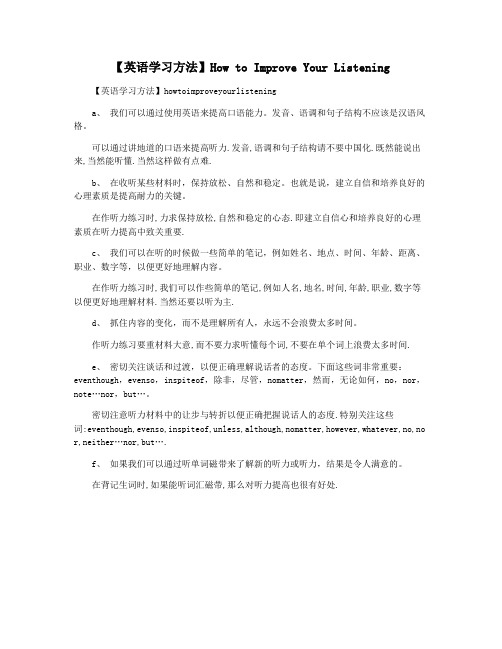
【英语学习方法】How to Improve Your Listening 【英语学习方法】howtoimproveyourlisteninga、我们可以通过使用英语来提高口语能力。
发音、语调和句子结构不应该是汉语风格。
可以通过讲地道的口语来提高听力.发音,语调和句子结构请不要中国化.既然能说出来,当然能听懂.当然这样做有点难.b、在收听某些材料时,保持放松、自然和稳定。
也就是说,建立自信和培养良好的心理素质是提高耐力的关键。
在作听力练习时,力求保持放松,自然和稳定的心态.即建立自信心和培养良好的心理素质在听力提高中致关重要.c、我们可以在听的时候做一些简单的笔记,例如姓名、地点、时间、年龄、距离、职业、数字等,以便更好地理解内容。
在作听力练习时,我们可以作些简单的笔记,例如人名,地名,时间,年龄,职业,数字等以便更好地理解材料.当然还要以听为主.d、抓住内容的变化,而不是理解所有人,永远不会浪费太多时间。
作听力练习要重材料大意,而不要力求听懂每个词,不要在单个词上浪费太多时间.e、密切关注谈话和过渡,以便正确理解说话者的态度。
下面这些词非常重要:eventhough,evenso,inspiteof,除非,尽管,nomatter,然而,无论如何,no,nor,note…nor,but…。
密切注意听力材料中的让步与转折以便正确把握说话人的态度.特别关注这些词:eventhough,evenso,inspiteof,unless,although,nomatter,however,whatever,no,no r,neither…nor,but….f、如果我们可以通过听单词磁带来了解新的听力或听力,结果是令人满意的。
在背记生词时,如果能听词汇磁带,那么对听力提高也很有好处.。
- 1、下载文档前请自行甄别文档内容的完整性,平台不提供额外的编辑、内容补充、找答案等附加服务。
- 2、"仅部分预览"的文档,不可在线预览部分如存在完整性等问题,可反馈申请退款(可完整预览的文档不适用该条件!)。
- 3、如文档侵犯您的权益,请联系客服反馈,我们会尽快为您处理(人工客服工作时间:9:00-18:30)。
Hangman Hangman pron is a paper and pencil guessing game for two or more players. One player thinks of a word, phrase or sentence and the other tries to guess it by suggesting letters or numbers. The word to guess is represented by a row of dashes, giving the number of letters, numbers and category. If the guessing player suggests a letter or number which occurs in the word, the other player writes it in all its correct positions. If the suggested letter or number does not occur in the word, the other player draws one element of the hanged man stick figure as a tally mark. The game is over when the guessing player completes the word, or guesses the whole word correctly.
5. It is good to turn your mobile off when you go to sleep.
Fill the gaps with the correct phrase from the box.
useful advice Turn off Welcome earlier in the evening great to be here down low
Transcript:
Host: At exam time it is important to sleep well. Today we have Doctor Baker1 with us in the studio and he is going to give us five top tips for getting a good night’s sleep. Welcome to the show, Doctor Baker. Dr Baker: Thank you. It’s great to be here. Let’s start with tip one. Don’t go to bed with the television on. Some people think they can sleep well with the TV on, but the noise and lights mean you don’t really sleep well, so turn it off! Tip two: Don’t think too much before bedtime. Do your hardest homework earlier in the evening. Do easier homework later. If your brain is too busy and full of ideas it takes longer to get to sleep. Tip three: Don’t play video games for an hour before you go to sleep. They also make your brain too busy and active. Tip four: Turn off your cell phone when you go to bed. What is so important that it can’t wait until the morning? If possible, leave your phone in another room. Tip five: Play music if you like. But don’t play it too loud. Turn the sound down low. Host: Thank you, Doctor. That is very useful advice for our young listeners.
A Good Night's Sstanding: true or false
1. The guest in the studio is a teacher. 2.Some people can sleep well with a television on. 3. It is bad to think a lot before going to bed. 4. It is good to play video games before bed.
1.----to the show, Doctor Baker. 2. Thank you. It’s -----.Let's start with tip one.
3. Do your hardest homework-----.
4.-----your mobile when you go to bed. 5. Play music if you like. But turn the sound-----. 6. That is very-----for our young listeners.
